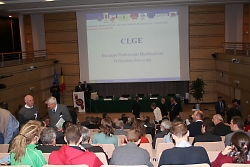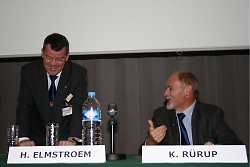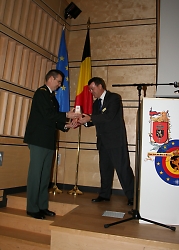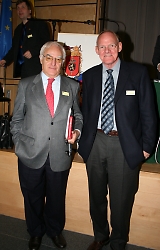CLGE International Conference 2005 - European Professional
Qualifications in Surveying
Brussels, Belgium, 1-2 December 2005
|

The conference was held at the Royal Military Academy, Brussels.
Participation to the conference exceeded all expectations. |

Henning Elmstrøm, President of CLGE and Klaus Rürup,
immediate past president of CLGE charing the conference. |
The Comité de Liaison des Géométres Européens (CLGE) or in English The
Council of European Geodetic Surveyors organised a conference 1-2 December
2005 in Brussels with a focus on the European Professional Qualifications in
Surveyors.
The conference was opened by a welcome address of Mr. Henning
Elmstroem, President of CLGE. The programme then included a number of
themes each with a number of high profile papers:
- The Present Status of the Surveying Profession in Europe.
Papers presented by Dr.
Otmar Schuster, Germany, Andrea
Liesenfeld, European Commission DG Internal Market and Services, Prof.
Karl-Werner Schulte, Germany, Prof. Stig Enemark, Denmark,
Mr. Hagen Graeff, Germany
- Free Movement of Surveyors in Europe
Discussion panel chaired by Dr.
Paddy Prendergast, Ireland
- Qualification for Authorised (Licensed) Surveyors
Papers presented by Prof.
Pedro Cavero, Spain, Mr. Jean-Cedric
Landry, France, Mr. Volkmar Teetzmann, Germany
- Models for Qualification
Papers presented by Mr. Daniel de Brone, Belgium, Mr.
René
Sonney, Switzerland, Mr. Rob Mahoney, United Kingdom
- The Future of the Surveying Profession in Europe
Final discussion chaired by Prof.
Stig Enemark, Denmark
- Challenges for Civil Society
Paper presented Philippe Busquin, Chairman of the Belgian National
Mapping Agency, MEP and former Commissioner for Research.
All papers and presentations are available on the CLGE website at
http://www.vugtk.cz/CLGE/seminar_brussels_2005/index.php. A final
statement will be prepared and published at the website as well.
There was a clear message from the conference that the surveying
profession throughout Europe is changing from a main focus on surveying and
measurement science to spatial science and land management dealing with the
management of rights, restrictions and responsibilities in land, where the
property systems and the legal issues are the core element. In this
perspective the future of the profession looks very promising.
The educational programmes change as well to focus on the provision of
the qualifications and competences needed within this multidisciplinary
area. What is not changing, however, is the public perception/image of the
surveyor. The perception of the surveyor as person doing measurements
(wearing green rubber boots) still stands. We will have to change that
perception in order to make politicians understand the importance of the
surveyors´ work as a central contribution to society, – and to attract a
sufficient number of good students to enter the profession in the future.
This is a key challenge facing the surveying profession.
Another key challenge was to establish an improved interaction between
the regulated and the free market within the surveying area. This, again,
should be motivated by an increased interaction between the private and
public sector and based on strong principles of ethics. The surveyors must
be able to not only manage within change but to manage the change itself.
This should hopefully change the image of the surveyor into highly skilled
and highly responsible problem solvers contribution to the development of
the national societies as well as the European Community.
FIG was represented at this conference by Prof. Stig Enemark, Vice
President of FIG and Prof. Pedro Cavero, Chair of FIG Commission 2.

CLGE President Henning Elmstroem convey his thanks to the conference
organiser Mr. Jean-Yves Pirlot, Secretary general of the Belgian
Union of Land Surveyors. |

Prof.
Pedro Cavero, Chair of FIG Commission 2 and Prof.
Stig
Enemark, Vice President of FIG represented FIG at the conference. |
Stig Enemark
7 January 2006 |


























